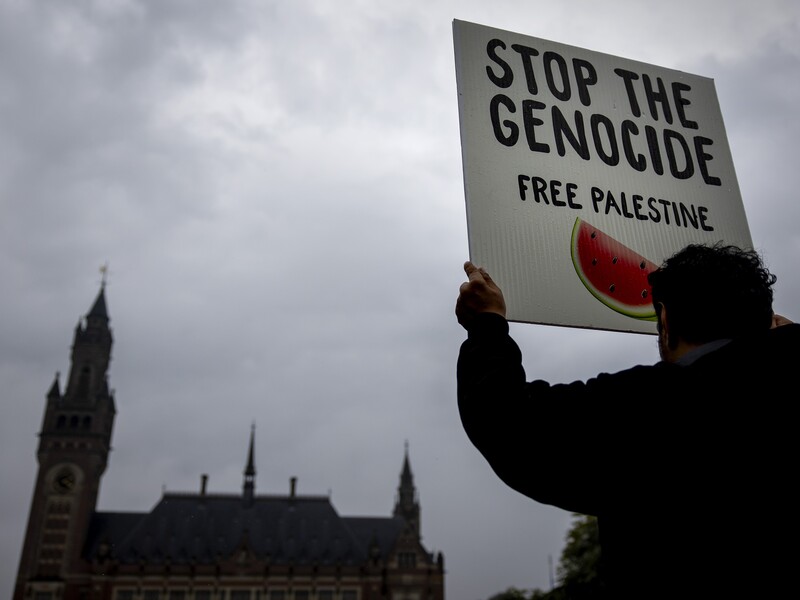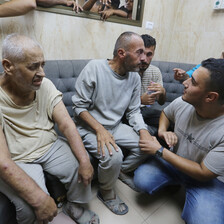The Electronic Intifada 15 July 2024

Despite many people being aware of Israel’s genocide in Gaza, numerous mainstream Western newspapers omit or minimize the reality.
ZUMAPRESSAs one credible source after another confirms that Israel is carrying out a genocide against the Palestinians, we find ourselves living through a mass, public genocide denial.
At the end of February, Michael Fakhri, the UN special rapporteur on the right to food, denounced Israel’s forced starvation of Palestinians in Gaza and said, “In my view as a UN human rights expert, this is now a situation of genocide.”
A month later, Francesca Albanese, special rapporteur on human rights in the Palestinian territories occupied since 1967, concluded that “there are reasonable grounds to believe that the threshold indicating Israel’s commission of genocide is met.”
On Nakba Day, 15 May, the University Network for Human Rights (UNHR) released a report it had written with the International Human Rights Clinic at Boston University School of Law, the International Human Rights Clinic at Cornell Law School, the Center for Human Rights at the University of Pretoria, and the Lowenstein Human Rights Project at Yale Law School. The document shows in scrupulous detail that Israel has carried out a genocide in Gaza and is continuing to do so.
Even as this evidence accumulates, genocide denial has rarely, if ever, been so socially acceptable. Denying a well-documented genocide ordinarily discredits people, leaving them banished from respectable society and widely discredited.
Yet denying Israel’s genocide against Palestinians carries no significant social cost.
For example, soon after Fakhri’s remarks, Jonah Goldberg took to the Los Angeles Times to assure readers that Israel’s actions do not “amount to genocide.”
Rather than engage with the proof that Israel is committing genocide, Goldberg blames “the claim that Israeli policy toward Palestinians is racist and genocidal” on “Soviet propaganda,” Holocaust denial and Vladimir Putin.
Goldberg doesn’t bother to mention at all that Fakhri had just said that Israel’s actions are genocidal, preferring instead to punch at unspecified “Israel critics” without discussing the evidence any of them put forth. Genocide denial is, after all, considerably easier when one simply pretends that the proof it’s happening doesn’t exist.
The British newspaper The Telegraph ran a commentary that takes the same approach. Stephen Pollard’s op-ed, “No, Israel Isn’t Committing Genocide,” simply declines to note the ample evidence readily available.
Publishing overt genocide denial typically consigns media outlets to the ill-lit corners of the internet but that hasn’t been The Telegraph’s fate while the Los Angeles Times remains a flagship newspaper of West Coast liberalism.
Minimizing and victim blaming
Genocide deniers don’t always explicitly say that a genocide did not happen or is not happening.
Sociologist Johanna Paul – drawing, in a grim irony, on the work of renowned Israeli genocide scholar Israel Charny, who defends the crimes in Gaza – points to genocide denial “strategies that confuse or cloud the events and their context” including “minimizing of death tolls; the reversing of victim-perpetrator roles and claiming that killings were committed only in retaliation or self-defense (victim blaming).”
One doesn’t have to look very hard to find the inversion of perpetrator and victim, manifest in, for example, the untenable notion that Israel is defending itself in Gaza.
Equally commonplace has been victim blaming that takes the form of saying Palestinians are responsible for their own deaths. This approach is manifest in, for example, the erroneous view that the Palestinian body count can be attributed to Hamas’ alleged use of human shields.
Downplaying casualty figures has likewise been a common variety of Gaza genocide denial. As genocide scholar Adam Jones puts it, this numbers game involves depicting reports of atrocities and mass killing as “exaggerated and self-serving.”
Since Fakhri said that Israel is committing genocide, the chief source of Gaza casualty minimization has been Abraham Wyner, a professor of statistics and data science at the Wharton School of the University of Pennsylvania.
Wyner is author of the Tablet article, “How the Gaza Ministry of Health Fakes Casualty Numbers,” which is subtitled, “The evidence is in their own poorly fabricated figures.” Pollard’s denialist screed leans heavily on Wyner’s article and The Telegraph ran a separate piece regurgitating Wyner’s claims, as did Canada’s National Post.
Wyner argues that the death tolls Gaza’s health ministry releases “are not real. That much is obvious to anyone who understands how naturally occurring numbers work.”
Much of Wyner’s article is baseless speculation.
For instance, he claims that the flaws he sees in the ministry’s data are “most likely” because “the Hamas ministry settled on a daily [casualty] total arbitrarily.” He offers zero evidence that the “Hamas ministry” doing that is “likely,” let alone “most likely.”
Wyner says that he studied the ministry’s figures for 26 October to 10 November and that these cannot be believed, pointing to such apparent irregularities as the graph of total deaths by date “increasing with almost metronomic linearity.” Wyner faces an immediate problem in that the Gaza health ministry’s numbers are generally considered reliable, so much so that Israeli intelligence utilizes them.
A further problem for Wyner is that The Lancet published an article by three scholars who looked at data from 7 October to 10 November, a substantially larger sample size than he examined. The researchers found “no evidence of inflated mortality reporting from the Gaza Ministry of Health.”
They reached this conclusion by comparing the ministry’s “cumulative-reported mortality” and reports by the UN agency for Palestine refugees (UNRWA) of its staff members’ deaths.
Wyner attempts to discredit The Lancet study by saying that its authors “relied on a crucial and unverified assumption: that UNRWA workers are not disproportionately more likely to be killed than the general population. That premise exploded when it was uncovered that a sizable fraction of UNRWA workers are affiliated with Hamas. Some were even exposed as having participated in the Oct. 7 massacre itself.”
Nothing convincing has been “uncovered” about UNRWA nor have its employees been “exposed” as having participated in any killings. By the time Wyner’s piece was published, Israel’s accusations against UNRWA were widely discredited. Yet he writes as if Israel’s slanders against UNRWA discredit The Lancet article’s conclusion that the Gaza health ministry is trustworthy.
Genocide omission
A further, particularly insidious form of genocide denial is, I submit, discussing Gaza as though what’s happening isn’t a genocide: genocide denial by omission.
I used the media aggregator Factiva to examine The New York Times and The Washington Post’s Gaza coverage from 28 February, the day after Fakhri said that Israel was committing genocide, through 28 May, a period wherein Albanese and the University Network for Human Rights and its partners reached the same conclusion and provided detailed accounts of the evidence that led them to this position.
In the period I looked at, the two papers ran a combined 1,967 pieces that include the words “Israel” and “Gaza.” Of these, 270, or just 14 percent, contain the word “genocide” or any variation on the term.
Put another way, 86 percent of articles in The Times and The Post do not inform their audience that many credible observers say that what Israel is doing to Gaza and its people constitutes a genocide.
These outlets are reporting on the people carrying out a genocide, and on the people subjected to it, without mentioning that what is happening is widely regarded as a genocide by authoritative sources. That, for practical purposes, is genocide denial.
Denying genocide abets genocide
In a just world, those who are denying the genocide in Gaza would be treated as pariahs rather than given space to propagandize mass audiences. The reason that isn’t the case is straightforward: The denialists I’ve discussed are writing for outlets that are based in the United States, UK and Canada, all of which are participants in Israel’s genocide in Gaza.
Obscuring that a genocide is taking place, what its causes are, and who is responsible can lead to upside-down conclusions about how to stop it, how to prevent it from happening again, and who to hold accountable for the slaughter. Genocide denial by omission can also foster misperceptions that see the violence as too complex to assess, let alone do anything about.
In this respect, denying a genocide while it plays out is an even graver political, intellectual and moral failing than denying one that has already taken place: unlike a genocide that occurred in the past, a genocide happening in the present can be halted, its harms mitigated. The more discursive space and power Gaza genocide denialists hold, the more difficult it will be for the Palestine solidarity movement to continue to build the critical mass necessary to stop their governments’ participation in this most severe crime.
The task, therefore, of every anti-racist, anti-colonial and anti-imperialist writer is to expose the denialists’ case as genocide-enabling distortions and lies.
Greg Shupak is an academic who writes fiction and political analysis. He is the author of The Wrong Story: Palestine, Israel, and the Media.
Tags
- Gaza genocide
- Michael Fakhri
- Francesca Albanese
- University Network for Human Rights (UNHR)
- International Human Rights Clinic at Boston University School of Law
- International Human Rights Clinic at Cornell Law School
- Center for Human Rights at the University of Pretoria
- Lowenstein Human Rights Project at Yale Law School
- Jonah Goldberg
- Los Angeles Times
- Vladimir Putin
- The Telegraph
- Stephen Pollard
- Johanna Paul
- Israel Charny
- Adam Jones
- Abraham Wyner
- Wharton School
- University of Pennsylvania
- Tablet Magazine
- National Post
- The Lancet
- Factiva
- The New York Times
- The Washington Post





